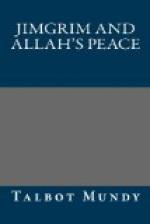Chapter One
“Look for a man named Grim.”
There is a beautiful belief that journalists may do exactly as they please, and whenever they please. Pleasure with violet eyes was in Chicago. My passport describes me as a journalist. My employer said: “Go to Jerusalem.” I went, that was in 1920.
I had been there a couple of times before the World War, when the Turks were in full control. So I knew about the bedbugs and the stench of the citadel moat; the pre-war price of camels; enough Arabic to misunderstand it when spoken fluently, and enough of the Old Testament and the Koran to guess at Arabian motives, which are important, whereas words are usually such stuff as lies are made of.
El Kudz, as Arabs call Jerusalem, is, from a certain distance, as they also call it, shellabi kabir. Extremely beautiful. Beautiful upon a mountain. El Kudz means The City, and in a certain sense it is that, to unnumbered millions of people. Ludicrous, uproarious, dignified, pious, sinful, naively confidential, secretive, altruistic, realistic. Hoary-ancient and ultra-modern. Very, very proud of its name Jerusalem, which means City of Peace. Full to the brim with the malice of certainly fifty religions, fifty races, and five hundred thousand curious political chicaneries disguised as plans to save our souls from hell and fill some fellow’s purse. The jails are full.
“Look for a man named Grim,” said my employer. “James Schuyler Grim, American, aged thirty-four or so. I’ve heard he knows the ropes.”
The ropes, when I was in Jerusalem before the war, were principally used for hanging people at the Jaffa Gate, after they had been well beaten on the soles of their feet to compel them to tell where their money was hidden. The Turks entirely understood the arts of suppression and extortion, which they defined as government. The British, on the other hand, subject their normal human impulse to be greedy, and their educated craving to be gentlemanly white man’s burden-bearers, to a process of compromise. Perhaps that isn’t government. But it works. They even carry compromise to the point of not hanging even their critics if they can possibly avoid doing it. They had not yet, but they were about to receive a brand-new mandate from a brand-new League of Nations, awkwardly qualified by Mr. Balfour’s post-Armistice promise to the Zionists to give the country to the Jews, and by a war-time promise, in which the French had joined, to create an Arab kingdom for the Arabs.
So there was lots of compromising being done, and hell to pay, with no one paying, except, of course, the guests in the hotels, at New York prices. The Zionist Jews were arriving in droves. The Arabs, who owned most of the land, were threatening to cut all the Jews’ throats as soon as they could first get all their money. Feisal, a descendant of the Prophet, who had fought gloriously against the Turks, was romantically getting ready in Damascus to be crowned King of Syria. The French, who pride themselves on being realistic, were getting ready to go after Feisal with bayonets and poison-gas, as they eventually did.




